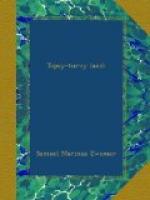[Illustration: PUZZLE OF THE THIRTY MEN.]
You begin to count from the left, as the captain did, and if you mark out every ninth man you can keep on counting out the ninth men until only upright strokes are left.
From your knowledge of arithmetic, can you tell me the reason of this puzzle?
The Arabs remember the puzzle by some verses in which every dotted letter stands for an unbeliever and those that have no dots stand for Moslems.
You see that even the story of Jonah and the whale is topsy-turvy out in Arabia!
XVI
GOLD, FRANKINCENSE AND MYRRH
In olden times Arabia was a much more important country than it is to-day. Before there were large seagoing ships, all the trade between India, Persia, even China, on the east, and Egypt on the west, was carried on camels. The caravans at that time used to cross Arabia in all directions, and the men who drove these camel-trains grew wealthy, as railroad magnates do to-day. We read about this early traffic on these highways of the desert in the Old Testament as well as in the old Greek histories. The province of Yemen was celebrated for its wealth and civilisation as early as the time of Solomon. It was then called Sheba and the old capital was called Marib, a little northeast of the present city of Sanaa. There are still many extensive ruins and inscriptions which testify to the height of their civilisation. We read of one of the queens of Sheba (the Arabs say she was named Bilkis) who came to prove Solomon with hard questions. She came with a large caravan of camels bearing spices and gold in abundance; her present to Solomon consisted of “an hundred and twenty talents of gold, and of spices great abundance, and precious stones.” Gold is no longer found in Arabia but it was undoubtedly once very plentiful there. All the old writers speak of Arabia as a-gold country. One of the Greek geographers speaks of a stream in which large nuggets of gold were found. Some people think Ophir was in Arabia. However that may be, the traveller Burton explored the northwestern part of the peninsula and found old mines and even traces of gold dust. If Job lived in the land of Midian we can well understand how he could describe mining operations so well as he does in the twenty-eighth chapter of his book.
[Illustration: BRANCH OF INCENSE TREE.]
Frankincense and myrrh were also carried across Arabia by the caravans, and both of these precious gums came from Arabia itself and are still found there. One of the oldest articles of commerce was incense. The gum was used in sacrifices and in all the heathen temple worship as well as by the Jews in their worship. One thousand talents’ weight of frankincense was brought every year to Darius, the Persian king, as tribute from Arabia. The present incense country is southern Arabia, especially Hadramaut. Here




